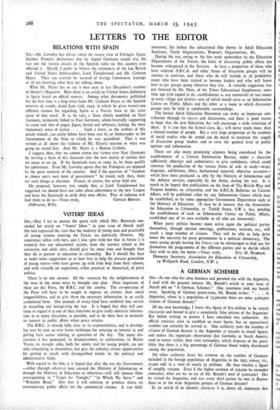VOTERS' IDEAS
Snt,—May I try to answer the query with which Mrs. Bentwich con- cluded her article on "Voters' ideas" in your issue of March znd? She had expressed the view that the majority of young men and practically all young women entering the Forces are politically illiterate. My experience tallies with hers, and I also rgree with her that in future it is essential that our educational system, from the nursery school to the university and adult class, should give far more time and thought than they do at present to education in citizenship. But I should like here to make some suggestions as to how best to help the present generation of young voters—who have grown up with little help from their schools, and with virtually no experience, either practical or theoretical, of party politics.
There is no one, answer. All the resources for the enlightenment of the man in the street must be brought into play. Most important of these are the Press, the B.B.C. and the cinema. The co-operation of the Press will have to be sought to impress on citizens their social remonsibilities, and to give them the necessary information in an easily assimilated form. Our journals of every kind have rendered fine service in recording and interpreting the war. It is hoped that they will con- tinue to regard it as one of their functions to give really objective informa- tion in as many directions as possible, and to do their best to maintain an interest in public affairs when peace returns.
The B.B.C. is already fully alive • to its resPonsibilities, and is develop-, ing year by year an ever better technique for arousing an interest in and getting facts across relating to questions of the day. The many dis- cussions it has sponsored, its dramatisations, its celebrations, its Brains Trusts, its straight talks, both for adults and for young people, are not only stimulating in themselves, but give the ordinary citizen opportunities for getting in touch with distinguished minds in the political and administrative fields.
With regard to the film, it is hoped that after the war the Government —either through whatever may succeed the Ministry of Information or through the Ministry of Education or otherwise—will still sponsor films corresponding to "Target for Tonight," "In Which We Serve" and " Waterloo Road." Also that it will continue to produce shorts on contemporary public affairs for the commercial cinema. A vast field, moreover, lies before the educational film shown in Adult Education Institutes, Youth Organisations, Women's Organisations, &c.
During the war, owing to the fine work undertaken by-the Education Departments of the Forces, the habit of discussing public affairs has become widespread in the Services. At least a proportion of those who have enjoyed A.B.C.A. and' other forms of discussion groups will be anxious to continue, and those who do will include in all probability many who have been trained to become leaders and who will know how to get groups going wherever they live. A valuable suggestion was put forward by Mr. Dent, of the Times Educational Supplement, some time ago with regard to th, . establishment as war memorials of two rooms in every village and district—one of which would serve as an Information Centre on Public Affairs and the other as a room in which discussion groups may be held in comfortable surroundings.
The formal Adult Education Movement can make an important con- tribution through its classes and discussions, and there is good reason to hope that the new Education Act will encourage a wide extension of these. It is true that the formal class, &c., will never reach more than a limited number of people. But a very large proportion of the students of social studies who do attend can do much to maintain the supply of discussion group leaders and to raise the general level of public opinion and information.
There are also many promising schemes being considered for the establishment of a Central Information Bureau, under a direction sufficiently objective and authoritative to give confidenee, which could continue the production of the various forms of aids to study—maps, diagrams, exhibitions, films, \ background material, objective accounts— which have been produced so ably by' theMinistry of Information and the defence services, especially by the Army, during the war. It is much to be hoped that publications on the lines of The British Way and Purpose booklets on citizenship, and the A.B.C.A. Bulletins on Current Affairs, will be published tither by any Information Centre which may be established, or by some appropriate Government Department such as the Ministry of Education. (It may be of interest that the Association for Education in Citizenship, 51 Tothill Street, S.W. i, has, pending the establishment of such an Information Centre on Public Affairs, established one of its own available to all who are interested.)
When party politics become more active again the political parties themselves, through election meetings, publications, journals, etc., will reach a large number of citizens. They will be able to help drive home the necessity for party government in a political democracy. The more young people leaving the Forces can be encouraged to find out for themselves the programmes of the different parties and to decide which


























 Previous page
Previous page